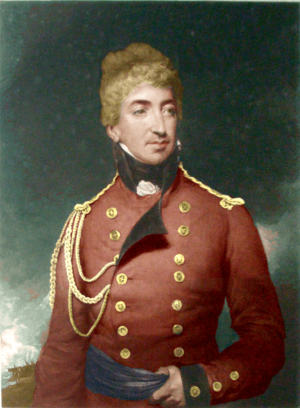Sir James Campbell, 1st Baronet facts for kids
Quick facts for kids
Sir James Campbell 1st Bt., of Inverneill
|
|
|---|---|
 |
|
| Born | 25 May 1763 Inveraray, Argyll |
| Died | 5 June 1819 (aged 56) |
| Spouse(s) | Agnes Margaret Hunter |
| Relations | General Sir Archibald Campbell, Willoughby Harcourt Carter Colonel Alexander Campbell of Possil General George Carter-Campbell Colonel Duncan Carter-Campbell of Possil |
Lieutenant General Sir James Campbell, 1st Baronet (born May 25, 1763 – died June 5, 1819) was an important British figure. He was a soldier, a politician, and a colonial administrator. He served as the Governor and Commander-in-Chief of the Ionian Islands. He was also a top officer in the British Army and held a special role for Scotland. Sir James Campbell is buried in the famous Westminster Abbey.
Contents
Early Life and Family Background
James Campbell was born on May 25, 1763, in Inveraray, Scotland. He was the oldest son of Sir James Campbell (1737–1805). His father was also a soldier and a Member of Parliament. James's family was part of a well-known Scottish clan called Clan Tearlach.
His uncle, General Sir Archibald Campbell, was a very important person. He was the Governor of Madras in India. This uncle bought the family estate called Inverneill House in 1773. James's mother, Jean, came from another branch of the Campbell family.
Becoming a Soldier
James Campbell started his military career in 1780. He joined the 1st Royal Scots Regiment of Foot. The next year, he became a lieutenant. He then moved to the 60th (Royal American) Regiment. He fought with them during the last two years of the American War of Independence. After the war, in 1783, he was promoted to captain.
In 1787, he went to India and joined the 73rd (Perthshire) Regiment of Foot. There, he worked as an assistant to his uncle, General Sir Archibald Campbell. His uncle was the Governor of Madras at the time. James later joined the 19th Light Dragoons. He fought in three campaigns during the Third Anglo-Mysore War. This war was against a powerful ruler named Tippoo Sahib.
Rising Through the Ranks
James Campbell continued to advance in his military career. In March 1794, he became a major. Later that year, he was promoted to lieutenant colonel of the Cheshire Fencibles. He served in the Channel Islands and Ireland until 1800.
In 1800, he became an assistant Adjutant-General at the Royal Horse Guards. This was a very important role in the army. In 1801, he was promoted to colonel. By 1804, he was a lieutenant colonel of the 61st (South Gloucestershire) Regiment of Foot.
In 1805, he was made adjutant general for a special force. This force was sent to the Mediterranean region. He worked in this role from 1805 to 1813. He earned the trust of all the generals he worked with in Sicily.
Governing the Ionian Islands
In 1810, James Campbell showed great leadership during a battle. A French general, General Cavaignac, tried to land troops in Sicily. Campbell quickly attacked with his soldiers, the Royal Scots Fusiliers. He forced the French troops to surrender. Over 800 French soldiers were captured, while the British lost only three men.
While serving as governor, he was promoted to major general in 1808. In 1813, he became a lieutenant general. The next year, in 1814, he was chosen to take control of the Ionian Islands. These islands were under French control. When the French Governor refused to hand them over, Campbell threatened to attack.
He stayed in the Ionian Islands as Governor and Commander-in-Chief until 1816. After that, Sir Thomas Maitland took over. Some French people said that Campbell was a very strict governor. They claimed he closed the university, academy, and printing press that the French had set up.
Later Life and Legacy
James Campbell returned to England in 1816. The next year, he received a high honor called the Knight Grand Cross of Hanover. In 1818, he was given the title of the 1st (and last) Baronet of Inverneill House. He also received an award from the Order of Saint Ferdinand and of Merit.
After his father passed away in 1805, James became the 10th Chief of Clan Tearlach. He also inherited a special family position called Heritable Usher of the White Rod for Scotland. However, he sold this title in 1806.
In 1794, he married Agnes Margaret. Her father, John Hunter, was a very famous surgeon and scientist. Agnes's mother, Anne (Home) Hunter, was a talented poet. Some of her poems were even set to music by the famous composer Joseph Haydn.
Sir James Campbell passed away on June 5, 1819. He did not have any children. He is buried in Westminster Abbey, close to his uncle, General Sir Archibald Campbell. After his death, his special title of Baronet ended. The Inverneill estate was then passed down to his brothers.
Images for kids
See also


